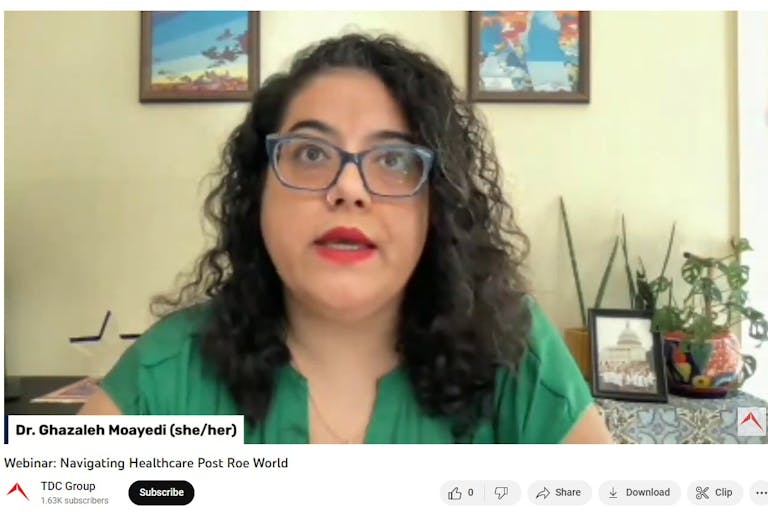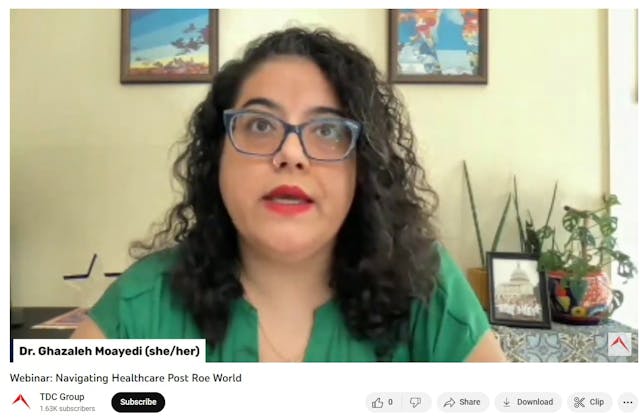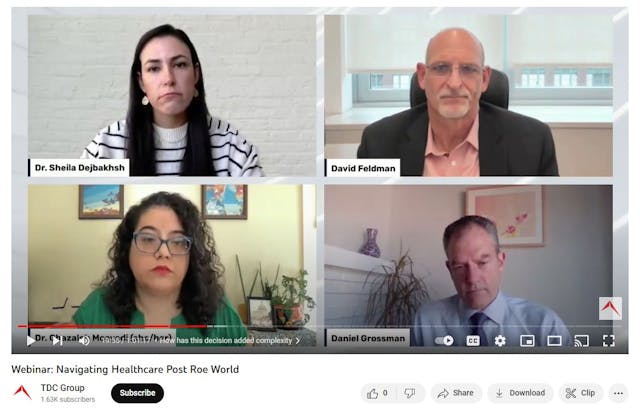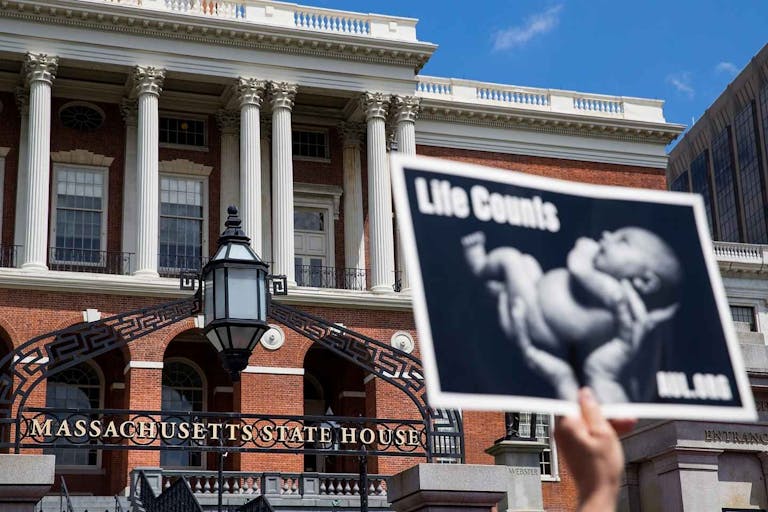In the wake of the #Dobbs decision, roughly half of OB/GYN residents risk losing access to training required to complete their programs. @DrDGrossman, @dr_moayedi and Dr. Dejbakhsh express concerns regarding the impacts on training and #patientsafety. thedoctors.com/articles/train…

Abortionists encourage doctors to become ‘radicalized’ on abortion
Abortion Pill·By Carole Novielli
Abortionists encourage doctors to become ‘radicalized’ on abortion
Texas abortionist Ghazaleh Moayedi was one of three abortionists featured on a panel in a webinar discussion regarding post-Roe abortion in America. Moayedi told listeners, “Let this moment radicalize you.” The webinar, sponsored by the TDC Group, discussed telehealth for later abortion, the expansion of abortion at hospitals, and the limited documentation of abortion by health professionals, among other things.
TDC Group describes itself as “the marketing name for The Doctors Company” which is described online as “the nation’s largest physician-owned medical malpractice insurer.”

The webinar, which purported to discuss the “increased risks of delayed care Post-Roe,” described the panelists as “three prominent OB/GYNs.” But they were, in actuality, all abortionists with personal reasons to claim that the overturning of Roe v. Wade is risky for pregnant women.
“Webinar participants include Sheila Dejbakhsh, MD, MPH, of Orange Coast Women’s Medical Group; Daniel Grossman, MD, Professor at the University of California, San Francisco, and Director of Advancing New Standards in Reproductive Health (ANSIRH); and Ghazaleh Moayedi, DO, MPH, of Pegasus Health Justice Center,” the description in the webinar states.
No ‘Safe States’
Abortionist Moayedi, who recently testified that abortion is a “blessing” and an act of “love,” admitted in the webinar that she commits abortions in Dallas, Texas, and trains residents and medical students. Currently, Texas protects preborn children from abortion.
She also once boasted on Twitter, “Some days I leave clinic and think, ‘damn, I really WAS put on this earth to be the best damn #abortion provider this side of the Mississippi’. Not a humble brag, that’s a full on brag brag. I’m that good.”
“Just over the past year, four abortion providers have left the state,” Moayedi told webinar viewers. She also claimed, “I truly don’t think that any of us are in safe states.”
And without providing any evidence, Moayedi continued, “That people are criminalized for pregnancy outcomes in California and in New York and in Oregon and in Washington. And that all of these places are in danger of losing the human right bodily autonomy and abortion access.”
Moayedi also suggested that hospitals in states where abortion is legal should expand abortion access.
“Do you have an outpatient surgery unit? You should be doing procedures there. Do you have clinic space with procedure suites? You should be opening up for abortion services there,” she asked.
“Let this moment radicalize you,” Moayedi said in her ending comments.
Telehealth for late abortions proposed
Telehealth, where permitted, has typically been used for early abortions and dispensing the abortion pill, yet abortionist Sheila Dejbakhsh, also a webinar panelist, suggested using telehealth for late abortions.
According to the Abortion Care Network (ACN), telehealth for abortion is allowed in 31 states and Washington DC while, “19 states ban the virtual provision of abortion care, including telemedicine,” ACN recently claimed.

Sheila Dejbakhsh, who admitted in a different TDC Group video that she is comfortable providing abortion, also commits later abortions in California. She told viewers, “I think telehealth avenues are really nice in an ideal world way to get – maybe save a patient coming across state lines on time… not taking as many days off work, to kind of prepare them for the procedure and kind of expedite the process.”
Article continues below
Dear Reader,
Have you ever wanted to share the miracle of human development with little ones? Live Action is proud to present the "Baby Olivia" board book, which presents the content of Live Action's "Baby Olivia" fetal development video in a fun, new format. It's perfect for helping little minds understand the complex and beautiful process of human development in the womb.
Receive our brand new Baby Olivia board book when you give a one-time gift of $30 or more (or begin a new monthly gift of $15 or more).
But she also stated, “the legality of it is still a little murky.”
“I know for myself this is how I do expedite my own patients in my practice into those later term abortion cares and try to get them care as quickly as possible because, aside from the topic itself, it’s extremely time sensitive,” she said. “So I think telehealth can play a huge role and there’s a lot of room for benefit there. But its yet to be tapped into. Hopefully it will be something that will transform the care that we’re able to provide.”
Concerns about abortion training
The third panelist was abortionist Daniel Grossman, who called the post-Roe days “demoralizing.”
He expressed concern about a potential lack of abortion training post-Roe, claiming, “According to one analysis it is estimated that 44% of OBGYN residents… are training in a state that is likely to ban abortion.”
“What’s going to happen? We’re getting a lot of requests for trainees to come to our institution… I think this is something we also really need to think about and think about how physicians in private practice who do provide abortion care but maybe haven’t had trainees before might think about potentially opening their practice to a trainee and partnering with a local residency program if they’re located in a state where abortion is still legal,” Grossman added.
He later stated that in Northern California there is “a lot of interest suddenly among primary care providers, among general surgeons who are interested in getting training in abortion care if there’s a need for those services.”
Don’t document ‘self-managed’ abortion
Grossman reiterated his previous position that emergency room doctors should avoid documenting abortion pill complications to hide information from law enforcement in a potentially post-Roe environment:
There currently is no jurisdiction that mandates reporting of self-managed abortion. Especially if patients are using medications to self-manage their abortions and presenting to a health care setting for evaluation or to figure out if the abortion was complete. Generally, these patients present exactly the way a patient looks whose had a spontaneous miscarriage and, in most cases, it’s really not even necessary for us to know if the patient did something on their own to try and induce this pregnancy termination or if it was just spontaneous.
And asking patients and particularly documenting that information in health record can put patients at risk. And so, I think we should really ask ourselves is this information necessary? Is it clinically relevant? Is it necessary to document it in the chart? And, if it isn’t clinically relevant, we shouldn’t document it.
Of course, recording abortion complications as if they are natural miscarriage complications skews the true complication rate of abortions, leaving women (and the general public) in the dark about the true complication rates of chemical, self-managed abortions, which are likely to be significantly undercounted. This doesn’t benefit women; it only benefits the abortion industry and makes abortion appear safer than it actually is.
Separately, abortionist Ghazaleh Moayedi claimed the post-Roe environment endangers the physician patient relationship because “patients will lie to us” when seeking care.
“Patients are afraid to tell their physicians or clinicians the truth about…accessing self-managed abortion, having a miscarriage. And we should be concerned that these laws are leading to people needing to lie to us specifically to preserve their own safety,” she stated. “It will make it more challenging for us to provide healthcare, it will make it more challenging for us to be trusted,” she added.
Induced abortion is the deliberate killing of a preborn human, and therefore, cannot be reasonably considered health care. Health care seeks to preserve the health and life of both mother and child, not to intentionally kill.

Live Action News is pro-life news and commentary from a pro-life perspective.
Contact editor@liveaction.org for questions, corrections, or if you are seeking permission to reprint any Live Action News content.
Guest Articles: To submit a guest article to Live Action News, email editor@liveaction.org with an attached Word document of 800-1000 words. Please also attach any photos relevant to your submission if applicable. If your submission is accepted for publication, you will be notified within three weeks. Guest articles are not compensated (see our Open License Agreement). Thank you for your interest in Live Action News!
Read Next

Massachusetts Health Department wants primary care to include abortion
Cassy Cooke
·More In Abortion Pill

Abortion Pill
Florida and Texas re-file lawsuit challenging abortion pill
Carole Novielli
·
Abortion Pill
South Dakota AG tells abortion pill advertiser to 'cease and desist'
Bridget Sielicki
·
Abortion Pill
FDA Commissioner accused of intentionally delaying abortion pill safety review
Carole Novielli
·
Abortion Pill
Ohio doctor charged with six felonies for forcing abortion pill on woman
Bridget Sielicki
·
Abortion Pill
Law prohibiting distribution of abortion pill in Texas takes effect
Bridget Sielicki
·More From Carole Novielli

Abortion Pill
Florida and Texas re-file lawsuit challenging abortion pill
Carole Novielli
·
Investigative
Former Planned Parenthood staffer describes how women were coerced and misled
Carole Novielli
·
Human Rights
Books affirming the value of all humans are part of a time-honored, truth-telling tradition
Carole Novielli
·
Abortion Pill
FDA Commissioner accused of intentionally delaying abortion pill safety review
Carole Novielli
·
Investigative
Pro-abortion Guttmacher's 'policy solutions' prove they see parents as an enemy
Carole Novielli
·